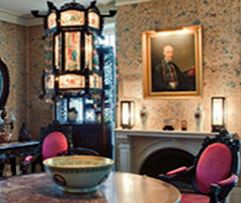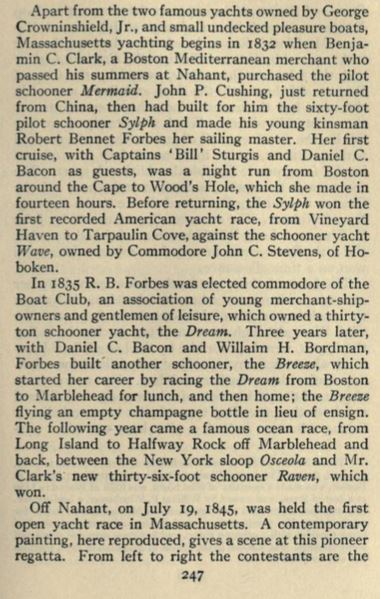Contents
- Introduction
- Preface
- Overview
- Relief Valve
- LECTURE 1: Why We Are In The Dark About Money
- LECTURE 2: The Con
- LECTURE 3: The Vatican-Central to the Origins of Money & Power
- LECTURE 4: London The Corporation Origins of Opium Drug Smuggling
-
LECTURE 5: U.S. Pirates, Boston Brahmins Opium Drug Smugglers
-
THE BOSTON BRAHMINS
- Clipper Ships
- The Boston Money Tree
- John Perkins Cushing
- Abiel Abbott Low
- William H. Russell and Samuel Russell
- The Combination Russell, Jardine, and Matheson
- Russell Sturgis
- Colonel Thomas Handasyd Perkins
- The Perkins Family
- Frances Perkins--The Only Good Brahmin
- American House of Russell and Co.
- Harvard Corporation
- Opium to Brahmins to Yale to CIA
- Forbes Family I
- Warren Delano
- Hope & Co. - Baring Brothers Bank
- John Jacob Astor
- Taft Family
- 1924 America's 1% Exposed
- Proof FDR Knew About his Grandfather's connection with Opium China Trade
- Forbes - John Kerry Family II
- George Bush Family Origins in Opium Drug Smuggling
- Black Market Bones
- Thuggee Barbara Bush Family
- Thuggee Bush Family and the CIA
- John Quincy Adams and the Chinese Opium Trade
- The Ammidons
- Augustine Heard
- Joseph Coolidge IV
- Lowell Family
- Pirates Profiteers Banksters Traders Transfers
- Pirates
- White Slavers, Cargo, Property, Auctions, Amazing Grace
- $ Colonial Labor: Indentured Servants
- England to Philadelphia Slave Trade and Opium
- Extract from Charter of Freedoms and Exemptions to Patroons 1629
- The Definitive Treaty of Peace
- Pennsylvania Charter of Privileges 28 October 1701
- Opium Trade -- American Drug Smuggling Pirates
- Opium In America
- 1% Power Elite Networks
- 1% Elite Networks Bush & The CIA
- BEFORE Skull & Bones
- SKULL AND BONES
- Caribbean Pirates in the American South
- Who Were the Tories
- The Golden Age of Imperialism Opium Act 1908
- Global Dominance Groups
- The New World Order
- Characteristics of Fascism
- War on drugs
- Lecture 5 Objectives and Discussion Questions
-
THE BOSTON BRAHMINS
- LECTURE 6: The Shady Origins Of The Federal Reserve
- LECTURE 7: How The Rich Protect Their Money
- LECTURE 8: How To Protect Your Money From The 1% Predators
- LECTURE 9: Final Thoughts
The Opium Trade "If the trade is ever legalized, it will cease to be profitable from that time. The more difficulties that attend it, the better for you and us." -- Directors of Jardine-Matheson
A rigged economy is when the top 1/10 of 1 percent owns as much as the bottom 90 percent. - Bernie Sanders
CUSHING was the English name of the 1% Elite Boston Opium Drug Smuggler.
In 1828, Russell & Company merged with another drug smuggling syndicate run by John Perkins Cushing. Cushing brought in his cousins, Robert Bennet Forbes and John Murray Forbes. Robert Bennet Forbes was Senator John F. Kerry’s great-grandfather. John Murray Forbes attended school at Phillips Academy in Andover, the alma mater of George H.W. Bush, and his sons Jeb and George W.
The fortunes that Russell & Company invested in US railroads and other infrastructure were the spoils from the Opium Wars, among the most inhumane and socially devastating events in human history.
etymology of
KA CHING $$
When this name was pronounced by non English speakers
it sounded like Ka Ching - Ch Ching - Ka Shing
There are many examples of how names like Cushing became borrowed Chinese words that morphed into sounding like the word Ku-Shing or Ka Ching in American English Standard then becomes part of the accepted Amercian English lexicon. [ See Linguistics - Creole, Pidgin, Vernacular, Dialect ]
-
Ka-Shing is pronounced Ka Ching by Americans. Only much later was it associated with the sound of a cash register.
Sir Li Ka Shing is the riches man in Hong Kong. Asia's richest man, Hong Kong's conglomerate magnate Li Ka Shing, has historic ties with Kleiner Perkins Caufield & Byers. - Used in a sentence "Before long you’ll start counting rain drops—every one that fails to fall will ring ch-ching".
-
Shanghai retailers’ tills go ka-ching
shanghaidaily.com/business/consumer/Shanghai-retailers-tills-go-kaching/shdaily.shtml
I'VE GOT A YEN
FOR ...........
The borrowed Chinese word "yan" that referred to opium as "foreign mud" or "black smoke" was borrowed and entered the English language and that Americans pronounce "yen" ("a sharp desire or craving").

That is Houqua hanging over the fireplace in the FORBES HOUSE MUSEUM Houqua (Wu Ping-chien) (1769–1843), painted by the Chinese artist, Lamqua (Kwan Kiu-cheong) (1801–1860), whose instructor was the English-born artist, George Chinnery (1774–1852) along with hand-painted silk wall paper recreated from remnants found beneath the door moldings.
(Harvard Library) John Perkins Cushing
(April 22, 1787 – 1862), called "Ku-Shing" by the Chinese, was a wealthy Boston sea merchant, opium smuggler, and philanthropist. His sixty-foot pilot schooner, the Sylph, won the first recorded American yacht race in 1832, and the town of Belmont, Massachusetts is named after his estate.
The Maritime History of Massachusetts 1783-1860
Find picture of the Sylph American yacht race in 1832 page 246
Here is no catalogue of ships, reader, nor naval chronicle, but a story of maritime enterprise; of the shipping, seaborne commerce, whaling, and fishing belonging to one American commonwealth. I have chosen to catch the story at half flood, when Massachusetts vessels first sought Far-Eastern waters, and to stay with it only so long as wind and sail would serve. For to one who has sailed a clipper ship, even in fancy, all later models of ocean carriage must seem decadent. ~ Samuel Eliot Morison
Illegal Opium smuggling seemed like the ideal commodity and business for the 1%.
In 1820 Cushing brought on his cousin Thomas Tunno Forbes to train for the business.
See [ Forbes House Museum, Museum of the American China Trade] On view are portraits of the powerful Chinese foreign trade official, Houqua, and Thomas Tunno Forbes, the Captain’s older brother who perished in the waters of China in 1829.
John Perkins Cushing a Perkins nephew, was partner and head of the China branch until 1827 when he retired leaving Thomas Tunno Forbes, his protege, in charge.
Samuel Wadsworth Russell, a native of Middletown, Connecticut also had established himself in China trading silk, tea, and opium. Samuel Wadsworth Russell and Philip Ammidon were partners in the firm Samuel Russell & Co., and while prosperous they did not share the close business association that Cushing had with the powerful Hong merchant Houqua.
The untimely death of Forbes in 1829, uncovered a reference in his papers that if anything should happen to him the affairs of Perkins & Co. and Bryant & Sturgis should be looked after by Russell & Co. Cushing was in England at the time of Forbes' death and quickly returned to China to reorganize the business. In 1830 Bryant & Sturgis and Perkins & Co. were merged with Russell & Co. with Augustine Heard as partner and John Murray Forbes as a clerk in the Canton office.
Parkman, Cushing, Perkins Family Ties
Merchant Princes of Boston: Perkins family line From "Merchant Prince of Boston. Colonel T. H. Perkins, 1764-1854"
Carl Seaburg and Stanley Patterson The Makers of the Mold by Kenneth W. Newcomb Some Merchants and Sea Captains of Old Boston: Being a Collection of Sketches of Notable Men and Mercantile Houses Prominent During the Early Half of the Nineteenth Century in the Commerce and Shipping of Boston.
Thomas Parkman Cushing born 1787 died 1854
One of the Cushing Family is the Founder of Cushing Academy first co-ed boarding school for the elite.
Cushing Academy in Ashburnham, Massachusetts is a B-list prep school, old enough and rich enough to merit the appellation “elite,” but academically a cut (or two) below such first-rank institutions as Deerfield, Exeter, and Andover. If you have a spare $44,000 and you wish to unload Junior for grades 9-12, I suppose you might consider Cushing an option.
Timothy Orne Cushing, the Colonel's son by Catherine Orne, followed in the Orne family tradition and entered into the maritime trades. Becoming Captain Timothy Cushing with help and guidance from his grandmother Elizabeth, who paid for his instruction in Navigation, Cushing embarked on the coastal and Transatlantic merchant trade. Often working with his brother-in-law, Luke Baldwin, and stepfather, Elisha Mack, Captain Cushing commanded the Brig CHARLESTOWN PACKET from New Bedford, CHOCTAW, and SHAWMUT of Marblehead, Massachusetts. It appears that Timothy Cushing never married.
Sometime around 1826 Catherine Orne Cushing, Captain Timothy Cushing's sister, and Elizabeth Orne's granddaughter, married Luke Baldwin. Luke Baldwin was a merchant. In one venture he was apparently joint owner of the Brig SHAWMUT with Captain Cushing for a trading voyage to Smyrna. Luke Baldwin Jr. followed in his fathers footsteps. Conducting a merchant business from Boston, Luke Baldwin Jr. traded goods in San Francisco, Manila and Hong Kong with Morgan Hathaway & Co. Baldwin also conducted business with Fred Baker & Co., Parsons & Petit, John Chandler, all primarily of New York.
http://web.archive.org/web/20150615013913/http://library.mysticseaport.org/manuscripts/coll/coll246.cfm
In the late 1790's Smyrna (Izmer, today), Turkey a major source for opium began to become port of call for Americans.
Boodle Boys
Definition of Boodle, Boodle Boys and the Good Ole' Boy Network
This is why we don't know about the origins of the 1% Old Money.
The information is ONLY Open to qualified researchers. Boston Athenaeum http://www.bostonathenaeum.org/
http://catalog.bostonathenaeum.org/vwebv/holdingsInfo?bibId=39190
John Perkins Cushing https://en.wikipedia.org/wiki/John_Perkins_Cushing
Until 1792 part of the Perkins family shipping business, along with their Cabot relations was the slave trade. In 1789 Thomas H. Perkins first went to China with Elias Derby from Salem, Massachusetts. A "loyalist" cousin, who fled America during the War of Independence, George Perkins was a merchant in Symrna. With a solid "connection", a strong family framework and firm financial backing Perkins & Company became the leader in the American pack. It was a family affair. Thomas H. was brother-in-law of Russell Sturgis, an uncle to J.P. Cushing and brothers John M. and Robert B. Forbes. Joshua Bates, a partner in Baring Brothers Bank, handled the family business in London. He was married to a Sturgis. Russell Sturgis's grandson later became Chairman of the Board of Barings.
Perkins & Co. found that illegality both in nature and operation discouraged competition and used sporadic attempts by the Chinese Government to enforce their opium prohibition, "to [build] the machinery that allowed it to control the Canton market for Turkish opium." Perkins & Company became the first American firm to operate a "storeship" at Lintin in a new smuggling procedure. The opium was unloaded onto the "storeship," then the trading vessel would travel on to Canton with chits. The chits were then sold and the opium was retrieved later by the Chinese buyer. Smooth as silk—all illegal—but bribes were paid and business was good.Samuel Russell and Phillip Ammidon came to Canton in 1824, Russell having first been there in 1818 as a business representative for a merchant house out of Providence R.I. Ammidon went on to India to serve as the firm's opium buyer. In "a series of accidents and coincidental decisions" Russell & Company acquired a "virtual" monopoly on the American portion of the trade in the 1830's. Other eastern merchants failed, died, or retired like John Jacob Astor. Perkins & Company, resident partner in Canton, Thomas T. Forbes was drown in August of 1829, and he carried a letter which gave Russell "charge of the firm's [Perkin's] business."
